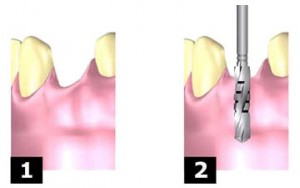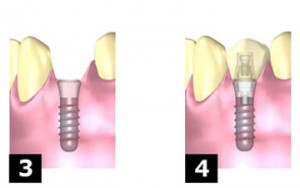Implants
Implantology is one of the most exciting developments of modern dentistry.
For the first time in history, it is possible to replace lost teeth with artificial roots.
Implants are made of titanium. They are inserted into the bone and after a healing period of 6 to 12 weeks a denture (crown, bridge, denture) is fixed on it. The advantages are that:
- In case of a single gap (only one tooth missing) there is no need to grind the neighboring teeth for a bridge.
- In case of a free end situation (missing teeth in the posterior area) a partial denture can be avoided.
- In case of edentia (all teeth are missing), we can provide a partial denture with much better hold compared to a full denture or even completely avoid any kind of removable denture.
For a better understanding, I have asked a few of my patients to describe their experiences with their own words:
- Andrea B., 68 years: “I had full dentures in both jaws for a long time without any problems. But in recent years retention became worse […]“ » Get further information.
- Hans F., 48 years: „I had periodontal problems and my lower cheek teeth became loose and had to be extracted. And then the problems started […]“ » Get further information.
- Horst M., 62 years: „I always had good teeth; I am almost 50 and have just a few fillings and no crowns. I was very proud about that […]“ » Get further information.
Did you know?
1) Amongst implant manufacturers there are leading companies with decades of experience, high-class products and branches all around the world but unfortunately also local producers of cheap and low-quality implants.
Implants have an external thread, which holds them in the jawbone and an internal thread, into which an abutment is screwed after the healing period, which connects implant and denture.
Depending on the kind of denture, a different type of abutment is necessary. For example: if you have an implant with a single crown. In case of a change of your dental situation the same implant can be used even years later to place a bridge or even a telescope denture on it after changing the abutment.
Low quality implants are often rejected because of their poor material and surface or there are no more abutments available, because the company went into bankruptcy.
2) Students of dentistry are taught basic theoretical knowledge about implants but get no practical training. However, once they are certified dentists, they can attend further education and even become licensed implantologists, which includes additional exams.
Nevertheless, this is not required by law, which is why you should check the surgeon’s qualifications before any surgical procedure.
I have performed implant surgery for more than 30 years. After a long time of experience and lots of further education, I was awarded with the title “Geprüfter Experte der Implantologie” (examined expert of implantology) by the DGOI (German association for oral implantology) and with the title “Diplomate of Implantology” by the ICOI (International Congress of Oral Implantologists).
I use exclusively high quality implants from leading producers.
Here you can see the different steps of an implant treatment
- the single tooth gap
- the implant bur
- the inserted implant
- the fixed crown with an abutment beneath.
Thanks to 30 years of implant surgery with thousands of inserted implants, I can perform the minimal invasive implant surgery completely painless and with barely noticeable postoperative swelling and pain in most cases.
Prices:
(one implant including surgery and one ceramic crown, as for Mr. Hans F. )
Germany:
approx. 2.600,- / 3000,- € (total costs)
Deutsche Dental Clinic:
75.000,- Baht (total costs)
You will get a high-quality implant from the leading producer including all parts and a full ceramic crown.







